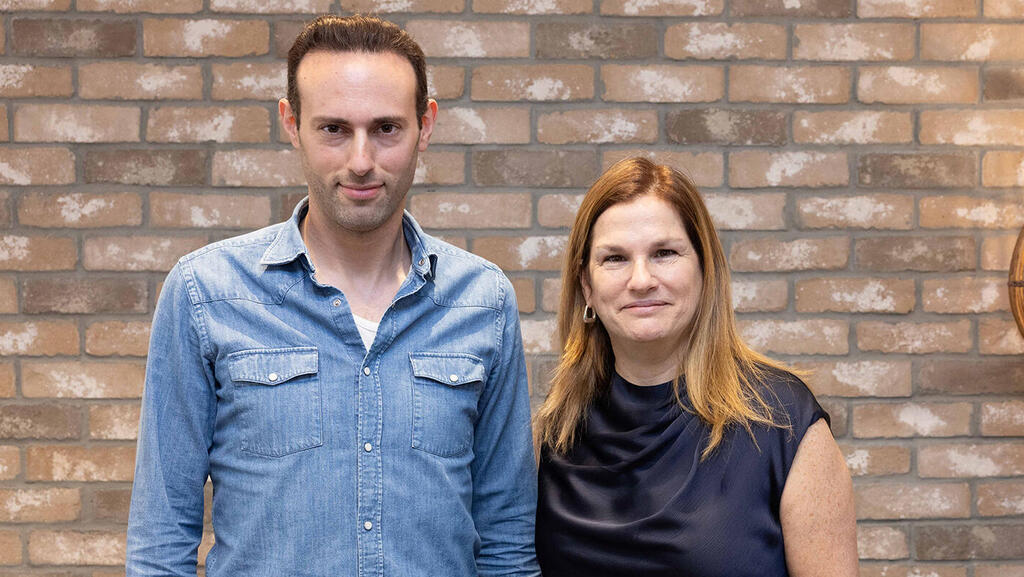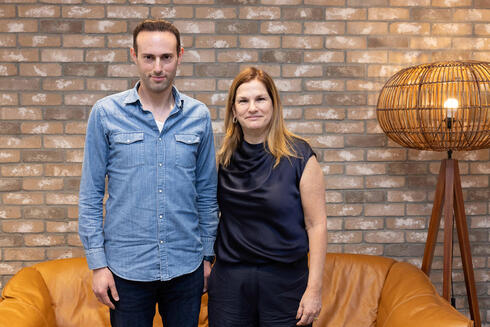
"It’s important to plan the vision from the very beginning"
At the height of the pandemic, Vered Raviv Schwarz faced a scenario few tech leaders could have imagined: running a travel-tech company in a world where no one was traveling. Today, as President and COO of Guesty, she sat down with Alon Dvir, CEO of immersive retail startup MersivX, as part of Calcalist and Poalim Tech’s Growth+ initiative.
At the height of the pandemic, Vered Raviv Schwarz faced a scenario few tech leaders could have imagined: running a travel-tech company in a world where no one was traveling. Today, as President and COO of Guesty, she sat down with Alon Dvir, CEO of immersive retail startup MersivX, as part of Calcalist and Poalim Tech’s Growth+ initiative—an effort to support early-stage entrepreneurs navigating uncertainty. Their conversation underscored a shared truth in startup life: survival isn’t just about reacting to crisis, but about holding on to vision, making strategic adjustments, and building for scale from day one.
Vered, tell us about a crisis you encountered along the way and how you dealt with it.
"The most significant crisis I encountered was during the COVID-19 pandemic. I was already at Guesty at the time—a travel-tech company that provides a platform for short-term property management—and the crisis hit us exactly in the field that had essentially ceased to exist: no one was leaving home. One of our board members told us, ‘We are going to zero sales.’ It was a defining moment.
"We built three scenarios: a doomsday budget—everything collapses; an interim budget; and an optimistic scenario—the crisis ends relatively quickly, tourism returns, and things stabilize. Every week we analyzed the data and tracked where we were—and somehow, we ended up on the optimistic track. People found new uses for short-term apartments. We connected property owners to the emerging vision of digital nomads. With careful management and close attention to real-time data, not only did we survive—we also raised money and acquired two other companies that did not survive."
What did you learn from this crisis?
"Don’t panic. And don’t pivot immediately just because something isn’t working—don't make a 180-degree shift overnight. Make small, ten-degree adjustments and don’t abandon your vision too quickly. Even in a crisis, you must be highly strategic: know how much money you have, how long it will last, and what is the safest path forward within those limits."
Alon, tell us about a crisis or challenge you experienced this past year.
"I see things as challenges, not crises. From day one of a startup—everything is one big challenge.
"One of the most significant moments was our first launch. It happened in Dubai, during a series of meetings and pitches. We launched with a major client and went big—with influencers, advertising, and a lot of buzz. Then the comments started coming in—the product wasn’t working. It was a 'do or die' moment. We immediately jumped on an emergency call, worked intensely, and in the end, found a solution. The product worked, the customer was satisfied—but it was a real rollercoaster."
Related articles:
Did you two talk about this challenge?
"We actually spoke more about the vision, about the path to realizing it, and about Product-Market Fit. We were optimistic and strategic in our discussion."
Vered, what advice did you give Alon?
"It’s important to plan the vision from the very beginning. When I was at Fiverr, when it was still a very small company, CEO Micha Kaufman used to say, ‘I think we’re going to be a billion-dollar company,’ and it sounded far-fetched—but eventually it happened. At Guesty, we’re doing the same—we believe we’ll be a billion-dollar company and are taking all the necessary steps, starting from day one, to build the infrastructure for that growth."
Michal Kissos Hertzog, CEO of Poalim Tech, which initiated the Growth+ project, said:"In 2025, entrepreneurs once again find themselves facing a complex reality: on the one hand, rapid technological progress, especially in the field of artificial intelligence, and on the other, geopolitical and economic challenges. The security situation in Israel continues to affect the local economy, and uncertainty increases the pressure on entrepreneurs, who must navigate their businesses through constantly changing conditions. The challenge is not just to survive, but to grow and innovate. In the midst of all this, it’s crucial to remember the value of personal balance. The ability to take breaks, spend time with family and friends, and maintain mental and physical health is not a luxury—it is a condition for long-term success. Entrepreneurs who manage to combine intensive work with a balanced life are the ones who can lead their companies forward, even in difficult times."
Through the Growth+ project, Calcalist and Poalim Tech continue to connect entrepreneurs with experienced mentors, providing tools and support for the challenging journey of building successful companies in today’s environment.
